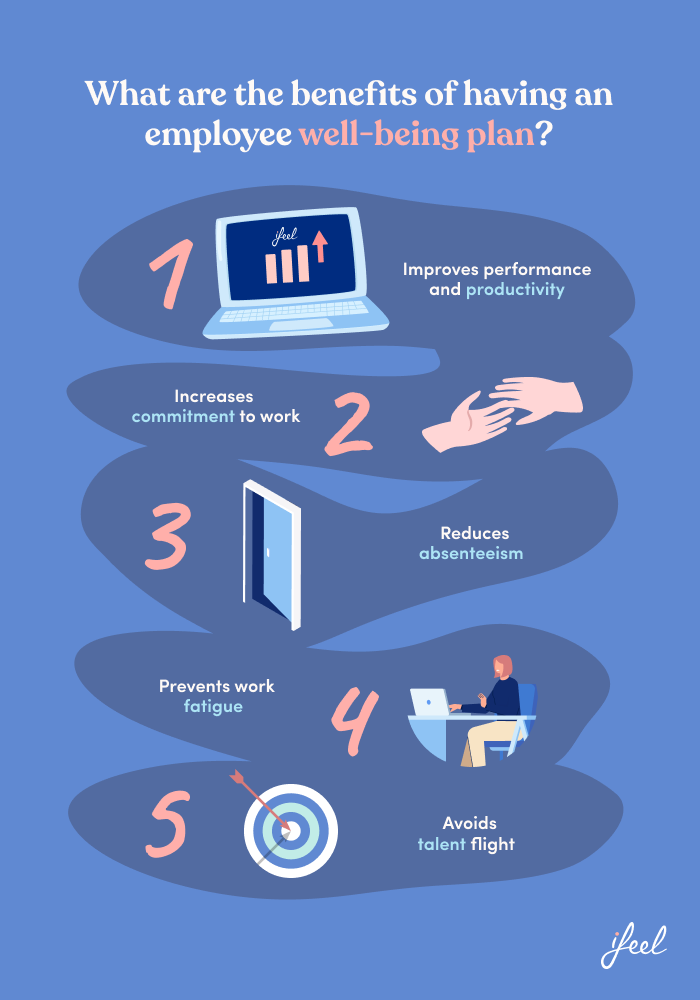As a company’s most important asset, employees’ mental health directly influences a company’s performance. As mental health becomes increasingly visible, so are well-being programs for employees. These programs aim to improve employees’ psychological well-being, which ultimately has consequences over their professional and personal lives.
This article sums up the benefits of implementing well-being programs for employees.
Why implement well-being programs for employees?
Employee well-being is a critical factor that affects both productivity and performance. When implementing well-being programs for employees, it is essential to align them to a company’s core values and objectives and outline a clear and concise mission statement. Another way to set out a company’s vision and the aim is to have a clear brand purpose, one to which all employees have access and is instilled in the company’s culture.
When designing or implementing well-being programs for employees, it is important to remember that each employee is an individual and therefore different. So, we cannot apply the same techniques to each person. Programs should be adapted to each employee’s needs and adapted to the company’s corporate culture.
Some companies aim to design their own well-being programs for employees, while others seek specialized help. Programs such as ifeel’s emotional well-being program for companies is a tool used to improve employees’ well-being with specialized psychologists and tailored advice for HR managers.

Benefits of well-being programs for employees
Having an employee well-being program in a company has numerous advantages, both for the employee and the company’s overall performance. Well-being programs also play a key role in today’s world as people’s mental health has been severely affected due to the Covid-19 pandemic. These mental health problems are directly related to lockdown, remote work, and the fear of contagion, amongst others. In a study published by Statista, conducted in seven countries, employees “reported their mental health in the lowest range had doubled, from 6.8 percent to 14.4 percent, since the COVID-19 outbreak”.
To highlight the importance of well-being, we have outlined seven key benefits of having well-being programs for employees:
1. Reduces absenteeism
Maintaining employee well-being during their work lifecycle is a vital pillar. Workplace absenteeism should be approached with a preventive outlook to identify the issue and stop it from arising in the first place. It is one of the main threats to sustainable productivity, and this is why we should identify, assess and take responsibility for the factors behind this phenomenon. One way to approach this threat is to use one of ifeel’s preventative tools, such as the work environment survey, which has been a successful tool for HR managers.
2. Reduces costs
Implementing well-being programs for employees also reduces costs. A study conducted by Harvard states, “medical costs fall by about $3.27 for every dollar spent on wellness programs and that absenteeism costs fall by about $2.73 for every dollar spent”. It is a matter of efficiency which allows companies to save energy in terms of psychological health promotion. Intelligent companies are committed to efficiency and not oriented to make more, but to make better.
3. Fosters team cohesion
Another critical aspect of well-being programs for employees is fostering team cohesion. Building positive relationships makes employees feel comfortable enough to ask for help and socialize with their colleagues, an element that can be useful when employees are feeling burnt out.
Another way to achieve this is by implementing team-building activities as part of the well-being program. Employees will interact with others, improving communication and interpersonal skills. Team building activities can also be helpful when reaching other objectives within the workforce: bringing together teams, developing skills, and employee motivation. Team building activities can also be a way to introduce both physical and mental exercises, which will make employees feel better and maybe even step out of their comfort zone.
4. Improves productivity
Burnt out, stressed, and anxious employees cannot reach their optimum level of productivity. Well-being programs also aim to improve productivity, and to do this organizations need engaged, motivated and confident employees. Healthy companies take their employees’ well-being as their responsibility because they know to what extent their work can positively or negatively impact their mental health.
5. Talent attraction and retention
Well-being programs for employees have a direct influence on talent attraction and retention. Well-being programs for employees can be a key factor for employees looking to join an organization and those who are already a part of it.
There are many factors potential employees take into account when actively looking for a job. With the latest shift in the work environment, especially after the Covid19 pandemic, employees look for benefits and flexibility in their professional lives, which ultimately affects their personal sphere. A well-being program for employees can be a deciding factor, as employees want to work in a healthy environment where a company invests in their health and knows that their mental health is taken care of.
When aiming to retain talent, wellness practices in the workplace also play a crucial role. A successful program can help keep workers loyal and highlight their role in the organization. Moreover, well-being programs for employees can make an organization stand out from the rest of its competitors as they are strategizing and prioritizing mental health. Feeling valued leads to engaged employees, who will be more productive, and productive employees generate better results and successes.
Wellness practices in the workplace
So, what additional practices can we include in the workplace to help improve employees’ well-being? HR managers can also implement healthy office practices to create a healthy work environment.
These habits include day-to-day actions that can be done in the workplace and help employees boost their psychological well-being.
- Take breaks at work: Employees should take timely breaks, whether to get fresh air, scroll on social media or have a chance to stretch their legs.
- Practice meditation: Meditation exercises can help an employee calm down ahead of a task.
- Maintain tidiness: Clear desk, clear mind. Sometimes small actions like this one can help an employee think clearly.
- Nurture relationships: socializing with other colleagues can help employees switch off from tasks when they need a break. A conversation can also be an excellent way to build bonds with coworkers and foster team cohesion.
Emotional well-being program for companies
At ifeel, we know that work should not disrupt people’s well-being. That is why our team of psychologists, experts in well-being at work, has created an emotional well-being program for companies that positively impacts talent retention, reduces absenteeism, and combats employee stress.
In our Resources section, you will find helpful material, such as podcasts, HR guides, or interviews with HR managers. In addition, we have a Psychosocial Risk Factors Template, which you can use to comply with the requirements of the Labor Inspection.
Thanks to our emotional well-being program, your company’s HR managers can receive personalized, data-driven advice on improving the psychological well-being of their teams. In addition, this program offers employees a 360° mental health care service structured at different levels according to their needs. Try our program today to see how it could help you.
We hope you found this post about well-being programs for employees interesting. If you would like more information about our emotional well-being program for companies, request it, and we will contact your team as soon as possible.
What are well-being programs for employees?
Well-being programs for employees are initiatives designed to promote and support the physical, mental, and emotional well-being of staff members. They can include a range of activities, such as online therapy, mental health resources, stress management workshops, and work-life balance initiatives.
What are the benefits of implementing well-being programs in the workplace?
Well-being programs can lead to numerous benefits, including increased employee engagement, improved productivity, reduced absenteeism, enhanced job satisfaction, and a positive work environment. They also demonstrate a commitment to employee health, which can attract and retain top talent.
How can well-being programs address mental health in the workplace?
Well-being programs can include mental health resources such as therapy services, employee assistance programs, mindfulness training, and stress reduction workshops. These initiatives aim to destigmatize mental health, provide support, and promote a mentally healthy work environment.
How can employers measure the effectiveness of well-being programs?
Employers can measure the effectiveness of well-being programs by conducting employee surveys, tracking absenteeism rates, analyzing productivity data, and monitoring employee feedback. These metrics can provide insights into the impact of the programs and help make necessary adjustments.







